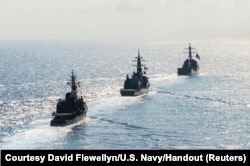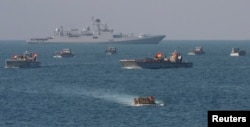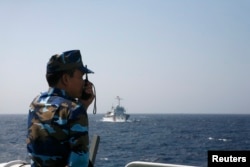Experts say four large nations can be expected to hold joint naval exercises and release statements about the South China Sea in the future.
Australia, India, Japan and the United States form a group that some experts are calling ‘the quad.’
Observers say the four are likely to take such measures rather than directly challenging China over its claims to the disputed waterway in the Pacific Ocean.
Stuart Orr is professor of strategic management at Dearkin University in Australia. He said, of the four countries, the United States is likely to take the largest part in such efforts.
“[The] number one presence is probably going to be driven by the U.S.,” said Orr. The professor said that India would also play a large part. He added that Japan and Australia would likely be “providing high-level logistical support.”
The four nations want the South China Sea to remain open. It is an important path for trade and rich in resources. But experts say the countries do not want to damage their trade ties with China.
“Rules-based order” in the disputed waterway
Leaders of the four nations met in the Philippine capital, Manila, in November to discuss how to keep the sea open.
At the time, Australia and Japan called for a “rules-based order” and “respect for international law.”
Indian Prime Minister Narendra Modi spoke to leaders of 10 Southeast Asian countries on January 26. Four of them also claim parts of the sea. The countries are members of ASEAN, the Association of Southeast Asian Nations. Modi said that India has promised to work with those nations on maritime issues.
Experts on the issue say more statements from the group are likely.
Ben Ho is an expert with the Military Studies Programme at the S. Rajaratnam School of International Studies in Singapore.
He said “…the most concrete thing they can do is to issue some statement on the South China Sea dispute, and even then I believe that China might not even be explicitly named in such a statement.”
Joint military exercises possible
The four countries also might send navy ships through the South China Sea, especially along its borders experts say. The action might take place in coastal waters of countries that want help resisting Chinese ships.
The United States has sent navy ships into the sea five times since Donald Trump became president last year. The policy of freedom of navigation in the sea has continued from the earlier administration of President Barack Obama.
Oh Ei Sun teaches international studies at Singapore Nanyang University.
He says Japan may “break out of its self-imposed restraints,” and carry out its own military exercises.
Oh said, “You will see Japan trying to make more frequent port calls and indeed join military exercises, providing training and so on to these nations.”
India and Australia would likely support military exercises aimed at warning China.
Stephen Nagy is a professor of politics and international studies at International Christian University in Tokyo. He pointed out that training and new equipment are things to be expected this year for Vietnam.
Vietnam has aggressively pushed its claims to areas of the South China Sea. In January 2017, Japanese Prime Minister Shinzo Abe promised to provide six boats for Vietnam’s coast guard.
The U.S. is to soon send an aircraft carrier to visit the Vietnamese port of Da Nang.
Ho says China is expected to deal with each action individually. He believes China might add to its developments on small landforms it controls in the South China Sea.
However, Ho says it is unlikely that India and Japan will push too hard in the area. Both have territorial disputes with China outside of the South China Sea.
Economic and trade ties also will play an important part in dealings linked to the sea. China, for example, is Australia’s largest trading partner.
“Canberra will not do anything drastic to damage the relationship,” Ho said.
I’m Mario Ritter.
Ralph Jennings reported this story for VOA News. Mario Ritter adapted it for VOA Learning English. Caty Weaver was the editor.
________________________________________________________________
Words in This Story
challenge –v. to test the ability of
management –n. the skill of overseeing a business, department or office
logistical –adj. things that must be done to plan and organize a complicate activity or event
maritime –adj. having to do with the sea or travel on it
explicitly –adv. very clear, without doubt
perimeters –n. the outside edge of something such as a territory or area
navigation –n. the act of finding one’s way from one place to another
drastic –adj. severe
We want to hear from you. Write to us in the Comments section and visit our Facebook page.








